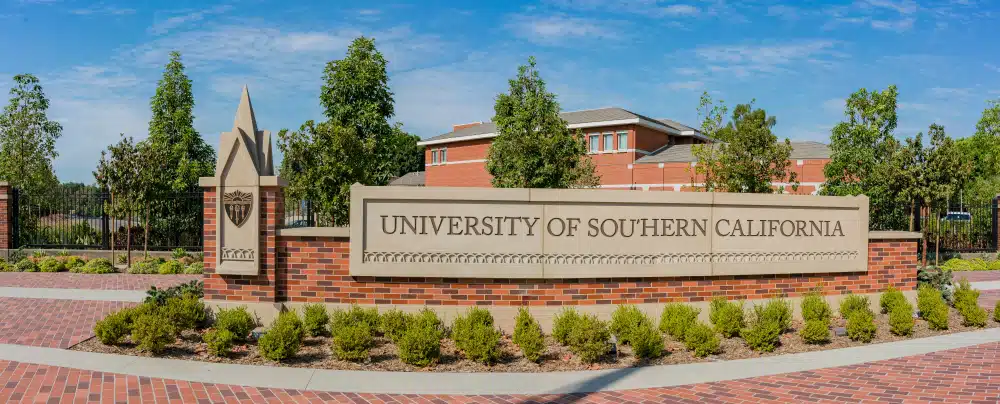Near Eastern Studies at USC
If you’re interested in learning more about the history and culture of the Near East, the University of Southern California is an excellent place to start. USC offers a top-rated Near Eastern Studies program that provides students with a deep understanding of the Near East and a wide range of career opportunities. In this article, we’ll explore the rich history and culture of the Near East, why you should study Near Eastern Studies at USC, the faculty and curriculum of the program, language and religious coursework, opportunities for study abroad, USC’s Center for Islamic Thought, Culture, and Practice, student life and resources, recent research and projects by faculty, and the future of Near Eastern Studies.
The Rich History and Culture of the Near East
The Near East is a vast and diverse region that spans from North Africa to Central Asia. It includes countries such as Egypt, Iran, Iraq, Israel, Jordan, Lebanon, Palestine, Saudi Arabia, Syria, Turkey and Yemen. The region is known for its rich history and culture, with significant contributions to fields such as art, music, literature, and philosophy. The Near East is also home to some of the world’s major religions, including Islam, Christianity, and Judaism. Studying Near Eastern Studies provides a unique opportunity to better understand these cultures and religions, and the ways they have influenced the world throughout history.
One of the most fascinating aspects of the Near East is its ancient civilizations. The region is home to some of the oldest civilizations in the world, including the Mesopotamian, Egyptian, and Persian civilizations. These civilizations left behind a wealth of artifacts, such as the pyramids of Egypt, the ziggurats of Mesopotamia, and the ruins of Persepolis in Iran. Studying these ancient civilizations can provide insight into the development of human society and culture.
Another important aspect of the Near East is its cuisine. The region is known for its flavorful and diverse dishes, such as hummus, falafel, kebabs, and baklava. Each country in the region has its own unique culinary traditions, influenced by its history, geography, and culture. Studying Near Eastern Studies can provide an opportunity to learn about the region’s cuisine and even try some of the dishes yourself.

Why Study Near Eastern Studies at USC
USC’s Near Eastern Studies program offers a broad and interdisciplinary approach to the study of the Near East, allowing students to explore different aspects of the region’s culture, language, history, and politics. The program is designed to provide students with a comprehensive knowledge of the Near East, and the skills to analyze and interpret primary sources and archaeological data. By studying Near Eastern Studies at USC, students will gain a better understanding of the social, cultural, and political dynamics of this complex region. Moreover, USC is one of the leading universities in the country for Near Eastern Studies, meaning students will benefit from nationally and internationally renowned professors and researchers.
One of the unique aspects of USC’s Near Eastern Studies program is its emphasis on language learning. Students have the opportunity to study Arabic, Hebrew, Persian, and Turkish, among other languages spoken in the region. This language training is essential for students who wish to pursue careers in diplomacy, international business, or academia, as it allows them to communicate effectively with people from the region and to access primary sources in their original language.
Another advantage of studying Near Eastern Studies at USC is the program’s strong ties to the local community. Los Angeles is home to one of the largest Middle Eastern diasporas in the United States, and USC’s program takes advantage of this by offering internships, study abroad opportunities, and community engagement projects that allow students to connect with the local community and gain practical experience in their field of study.
Meet the Professors and Researchers in the Near Eastern Studies Department at USC
The Near Eastern Studies program at USC is home to some of the most distinguished scholars and experts in the field. Students will have the opportunity to learn from professors who are actively engaged in cutting-edge research and have published extensively on topics such as Islamic law, the history of the Ottoman Empire, and the archaeology of ancient Persia. By working with professors in the Near Eastern Studies department, students will gain a deeper understanding of the region and its rich history and culture.
One of the professors in the Near Eastern Studies department at USC is Dr. Fatima Ahmed, who specializes in the study of Islamic art and architecture. Dr. Ahmed has conducted extensive research on the role of art and architecture in shaping Islamic societies and has published several articles and books on the topic. Her expertise in this area provides students with a unique perspective on the cultural and artistic traditions of the Near East. Students who take her courses will have the opportunity to explore the rich history of Islamic art and architecture and gain a deeper understanding of its significance in the region.
The Curriculum of Near Eastern Studies at USC
The curriculum of the Near Eastern Studies program at USC is designed to provide students with a comprehensive education in the history, language, religion, and culture of the Near East. Students will take a range of courses that cover topics such as ancient Near Eastern history, Islamic civilization, and contemporary Middle Eastern politics. Students will also have the opportunity to study one or more of the languages spoken in the Near East, including Arabic, Hebrew, Persian, and Turkish.
Additionally, the Near Eastern Studies program at USC offers students the chance to participate in study abroad programs in the Near East. These programs allow students to immerse themselves in the culture and language of the region, while also gaining valuable academic experience. Students can choose from a variety of study abroad programs, including semester-long programs in countries such as Egypt, Israel, and Turkey.
Furthermore, the Near Eastern Studies program at USC has a strong emphasis on research and scholarship. Students have the opportunity to work closely with faculty members on research projects, and many students go on to present their research at academic conferences. The program also hosts a variety of guest speakers and events throughout the year, providing students with additional opportunities to engage with the field of Near Eastern Studies.
Discovering the Languages of the Near East: Arabic, Hebrew, Persian, Turkish and More
The ability to speak one or more of the languages of the Near East is paramount to understanding the region’s culture, politics, and history. USC offers courses in various languages, allowing students to gain fluency in Arabic, Hebrew, Persian, and Turkish, among others. By immersing themselves in these languages, students will be better equipped to analyze primary sources and to communicate more effectively with people from these countries and the greater Arab and Muslim world.
Learning a language is not just about mastering grammar and vocabulary, it also involves gaining a deeper understanding of the culture and traditions of the people who speak it. USC’s language courses provide students with the opportunity to explore the rich literary and artistic traditions of the Near East, from the poetry of Rumi to the films of Youssef Chahine. By studying these works in their original language, students can gain a more nuanced understanding of the region’s history and contemporary issues, and develop a greater appreciation for its diverse cultures.

Understanding Islam and Other Religions in the Near East through Coursework at USC
USC’s Near Eastern Studies program offers courses on Islam, Christianity, Judaism, and other religions practiced in the Near East. Students will learn about the different practices, beliefs, and rituals of these religions, and how they interact with one another in the complex political and social context of the Near East. This course of study will give students the tools to understand how religion intersects with contemporary political issues such as nationalism, gender equality, and human rights.
Additionally, students in the Near Eastern Studies program have the opportunity to participate in study abroad programs in the Near East, where they can experience firsthand the religious and cultural practices of the region. These immersive experiences allow students to deepen their understanding of the complexities of religion in the Near East and gain a more nuanced perspective on the role of religion in society.
Opportunities for Study Abroad in the Near East through USC Programs
Studying near Eastern Studies at USC offers students the opportunity to spend one or more semesters living and studying in the Near East. USC offers study abroad programs in countries such as Egypt, Iran, and Turkey, giving students firsthand experience in the cultures and languages they are studying. Studying abroad also provides students with the chance to conduct independent research, visit archaeological sites and explore the region’s rich history and culture.
Furthermore, USC’s study abroad programs in the Near East offer students the opportunity to engage with local communities and gain a deeper understanding of the region’s social and political issues. Students can participate in community service projects, internships, and language immersion programs, which allow them to develop their language skills and gain practical experience in their field of study.
In addition, USC’s Near Eastern Studies faculty members are experts in their respective fields and provide students with personalized guidance and mentorship throughout their study abroad experience. Students can also take advantage of USC’s extensive alumni network in the Near East, which provides them with valuable networking opportunities and connections for future career prospects.
The Contributions of USC’s Center for Islamic Thought, Culture, and Practice to Near Eastern Studies
The Center for Islamic Thought, Culture, and Practice at USC is one of the top institutions in the country dedicated to the study and promotion of Islamic culture, law, arts, and history. The center offers programs and events that provide students with the opportunity to engage with some of the most prominent scholars and experts in the field. They work to create a community of scholars and students who are passionate about, and committed to, the study and advancement of Islamic thought, culture, and practice in the modern world.
One of the center’s most notable contributions to Near Eastern Studies is its extensive library, which houses a vast collection of books, manuscripts, and other materials related to Islamic culture and history. The library is open to students and scholars from around the world, and its resources have been instrumental in advancing research and scholarship in the field.
In addition to its academic programs, the center also hosts a variety of cultural events and activities that promote a deeper understanding and appreciation of Islamic culture. These include art exhibits, film screenings, and musical performances, as well as lectures and panel discussions on topics ranging from Islamic law and theology to contemporary issues facing Muslim communities around the world. Through these events, the center seeks to foster greater cross-cultural understanding and dialogue, and to promote a more nuanced and informed view of Islamic culture and history.
Career Paths for Graduates of USC’s Near Eastern Studies Program
Studying Near Eastern Studies at USCopens up many exciting career paths for graduates. These include careers in diplomacy, international development, journalism, teaching, and business. Many Near Eastern Studies graduates also go on to pursue advanced degrees in law, anthropology, history, or archaeology. By gaining an in-depth understanding of the region and its complex cultures and politics, students who graduate from USC’s Near Eastern Studies program will be well equipped to excel in a wide range of careers.
One of the most popular career paths for graduates of USC’s Near Eastern Studies program is diplomacy. With their knowledge of the region’s history, politics, and culture, graduates are well-suited to work in government agencies or international organizations, representing their country’s interests in the region. Additionally, many graduates find success in the field of international development, working to improve the lives of people in the Near East through projects related to education, healthcare, and infrastructure.
Another exciting career path for Near Eastern Studies graduates is journalism. With their deep understanding of the region, graduates can work as reporters, editors, or analysts for news organizations covering the Near East. They can also use their expertise to write books or produce documentaries that shed light on the region’s complex history and current events. Overall, the skills and knowledge gained through USC’s Near Eastern Studies program can lead to a fulfilling and impactful career in a variety of fields.
Student Life for Near Eastern Studies Majors at USC
USC’s Near Eastern Studies program provides students with many opportunities to connect with fellow students who share their passion for the study of the Near East. Students are encouraged to get involved in clubs and organizations that align with their academic interests, including the Middle East Studies Association, the Persian Student Association, and the Israeli Student Organization. These provide students with opportunities to meet people from a variety of backgrounds and in various stages of their Near Eastern Studies journey.
Additionally, the Near Eastern Studies program at USC offers study abroad opportunities for students to immerse themselves in the culture and language of the Near East. Students can choose from programs in countries such as Egypt, Israel, Jordan, and Turkey. These programs provide students with a unique opportunity to gain a deeper understanding of the region and its people, while also enhancing their language skills and cultural competency. Many students find that studying abroad is a transformative experience that enriches their academic and personal growth.

Resources Available to Students Studying Near Eastern Studies at USC
USC offers many resources that can assist students in their coursework and research in Near Eastern Studies. The university has an extensive library system, including the Doheny Library and the Norris Medical Library, which provide students access to rare and ancient texts, as well as the latest research in the field. USC also offers research opportunities to students interested in pursuing independent research projects, as well as funding opportunities and scholarships to support research and study abroad opportunities.
The Future of Near Eastern Studies: Trends and Innovations in Research and Education
The field of Near Eastern Studies is dynamic with many new trends and innovations emerging each year. Some of the most exciting developments in the field include the use of technology to access and analyze primary sources, the study of the role of gender and sexuality in Near Eastern societies, increasing awareness of non-Muslim minorities, and the rise of urban cultures in the region. The Near Eastern Studies program at USC is committed to staying at the forefront of these innovations and providing students with an education that reflects the current state of the field.
How to Apply to USC’s Near Eastern Studies Program
Students interested in applying to USC’s Near Eastern Studies program should visit the university’s website for upcoming program application deadlines. Admission requires standard materials including transcripts, essays, recommendation letters, and test scores, but each applicant is evaluated holistically for admission.
In addition to the standard application materials, USC’s Near Eastern Studies program highly values applicants who have demonstrated a strong interest in the region through extracurricular activities, internships, or research projects. Applicants are encouraged to highlight any relevant experiences or coursework in their application materials.
Conclusion
USC’s Near Eastern Studies program offers students an unparalleled opportunity to explore the history and culture of one of the most complex and diverse regions in the world. The program provides students with a comprehensive education in the Near East, encompassing history, language, culture, politics, and religion. USC offers opportunities for study abroad, research, and career advancement, as well as resources such as world-renowned faculty, libraries, and research projects. As the world becomes increasingly connected, it is more important than ever to study the region and people of the Near East. By studying Near Eastern Studies at USC, students will gain the foundation and skills necessary to make meaningful contributions to the field of Near Eastern Studies and society at large.
Furthermore, USC’s Near Eastern Studies program is committed to promoting diversity and inclusivity. The program actively seeks to include perspectives and voices from underrepresented communities in the field of Near Eastern Studies. This commitment is reflected in the program’s curriculum, faculty, and student body. By fostering a diverse and inclusive learning environment, USC’s Near Eastern Studies program prepares students to engage with the complexities of the region and contribute to a more equitable and just society.

How AdmissionSight Can Help You With College Admissions
AdmissionSight is a college consulting firm that provides personalized assistance to students throughout the college admissions process. Here are some ways that AdmissionSight can help you:
Admissions strategy: AdmissionSight can help you develop a strategic plan for your college application process. Our professional consultants can assist with identifying schools that are a good fit for your academic, extracurricular, and personal goals and help you plan and prioritize your application strategy.
Application review: AdmissionSight can review your application and provide feedback on how to improve it. We can offer suggestions on making your application stand out and highlighting your strengths and unique qualities.
Essay coaching: AdmissionSight can help you craft compelling essays that showcase your personality, goals, and achievements. We can guide you through the essay writing process and provide feedback on your drafts to help you refine your writing.
Interview preparation: AdmissionSight can provide interview coaching to help you feel confident and prepared for college interviews. Our experts can offer tips on how to present yourself professionally and how to answer common interview questions.
Extracurricular planning: AdmissionSight can help you plan and develop your extracurricular activities to make them more impactful and meaningful. We can suggest activities that align with your interests and goals and provide guidance on demonstrating your leadership and initiative.
Overall, AdmissionSight can provide valuable guidance and support throughout the college admissions process to help you maximize your chances of getting accepted into the college of your choice.
With a high success rate of over 75%, we have built a strong network in the past decade. Book an initial consultation today, free of charge!




































